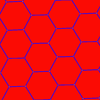In geometry, the kissing number is the maximum number of spheres of radius 1 that can simultaneously touch the unit sphere in n-dimensional Euclidean space. The kissing number problem seeks the kissing number as a function of n.
| n | 1 | 2 | 3 | 4 | 5 | 6 | 7 | 8 |
|---|---|---|---|---|---|---|---|---|
| Kissing number | 2 | 6 | 12 | 24 | 40 | 72 | 126 | 240 |
| Image | 
|

|
||||||
| Isogonal polyhedron |  {6} |
 t1{3,3} |
 {3,4,3} |
 r{3,3,4} |
 122 |
 231 |
 421 | |
| Isogonal tessellation | 
|

|

| |||||
| Isotopic polyhedron |  {3} |
 Rhombic dodecahedron |
 {3,4,3} | |||||
| Isotopic tessellation | 
|

|

|
Some known bounds
editThe following table lists some known bounds on the kissing number in various dimensions.[1] The dimensions in which the kissing number is known are listed in boldface.
For 2..8, the best reflective tessellation geometries are given, and a few suboptimal ones.
Notes
edit- ^ Mittelmann, Hans D.; Vallentin, Frank (2009). "High accuracy semidefinite programming bounds for kissing numbers". arXiv:0902.1105.
{{cite arXiv}}: Unknown parameter|accessdate=ignored (help) - ^ a b В. А. Зиновьев, Т. Эриксон (1999). "Новые нижние оценки на контактное число для небольших размерностей". Пробл. передачи информ. (in Russian). 35 (4): 3–11.
{{cite journal}}: Unknown parameter|ulr=ignored (help) English translation: V. A. Zinov'ev, T. Ericson (1999). "New Lower Bounds for Contact Numbers in Small Dimensions". Problems of Information Transmission. 35 (4): 287–294. MR 1737742.
- GoogleBook: Sphere packings, lattices, and groups, by John Horton Conway, Neil James Alexander Sloane, Eiichi Bannai